Incentives, Appreciation, and Knowledge Sharing in Public Sector HRM
VerifiedAdded on 2023/02/13
|38
|11884
|88
Report
AI Summary
This report, titled "Incentives can't buy me knowledge: The missing effects of appreciation and aligned performance appraisals on knowledge sharing of public employees," investigates the impact of incentives on public employees' willingness to share knowledge. The study, conducted through a 2x3 factorial survey experiment with 623 public employees in Germany, explores whether incentives, designed to satisfy needs for achievement or appreciation, influence both explicit and implicit knowledge sharing. The findings reveal that incentives positively affect the intention to share explicit knowledge but show no significant impact on implicit knowledge sharing. The research also indicates that the tested incentives do not negatively affect knowledge sharing, suggesting that while incentives may not hinder knowledge sharing, they also may not be effective in practice. The study contributes to the existing literature by providing insights into knowledge sharing within the public sector, the role of motivation-enhancing rewards, and the appropriateness of tangible rewards. The report highlights the need to explore ability and opportunity-enhancing practices to foster knowledge sharing effectively in public organizations, which are inherently knowledge-based.
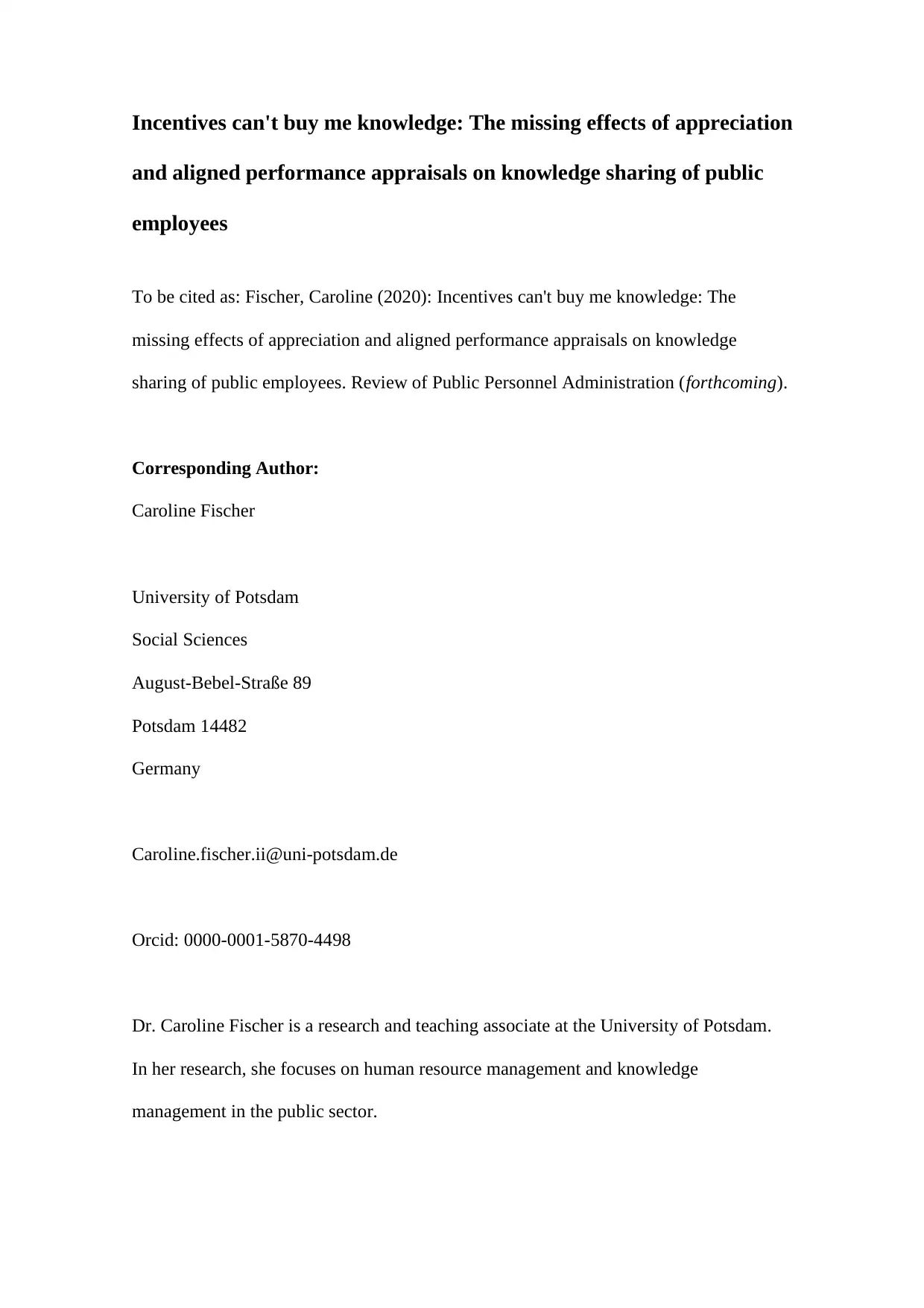
Incentives can't buy me knowledge: The missing effects of appreciation
and aligned performance appraisals on knowledge sharing of public
employees
To be cited as: Fischer, Caroline (2020): Incentives can't buy me knowledge: The
missing effects of appreciation and aligned performance appraisals on knowledge
sharing of public employees. Review of Public Personnel Administration (forthcoming).
Corresponding Author:
Caroline Fischer
University of Potsdam
Social Sciences
August-Bebel-Straße 89
Potsdam 14482
Germany
Caroline.fischer.ii@uni-potsdam.de
Orcid: 0000-0001-5870-4498
Dr. Caroline Fischer is a research and teaching associate at the University of Potsdam.
In her research, she focuses on human resource management and knowledge
management in the public sector.
and aligned performance appraisals on knowledge sharing of public
employees
To be cited as: Fischer, Caroline (2020): Incentives can't buy me knowledge: The
missing effects of appreciation and aligned performance appraisals on knowledge
sharing of public employees. Review of Public Personnel Administration (forthcoming).
Corresponding Author:
Caroline Fischer
University of Potsdam
Social Sciences
August-Bebel-Straße 89
Potsdam 14482
Germany
Caroline.fischer.ii@uni-potsdam.de
Orcid: 0000-0001-5870-4498
Dr. Caroline Fischer is a research and teaching associate at the University of Potsdam.
In her research, she focuses on human resource management and knowledge
management in the public sector.
Paraphrase This Document
Need a fresh take? Get an instant paraphrase of this document with our AI Paraphraser
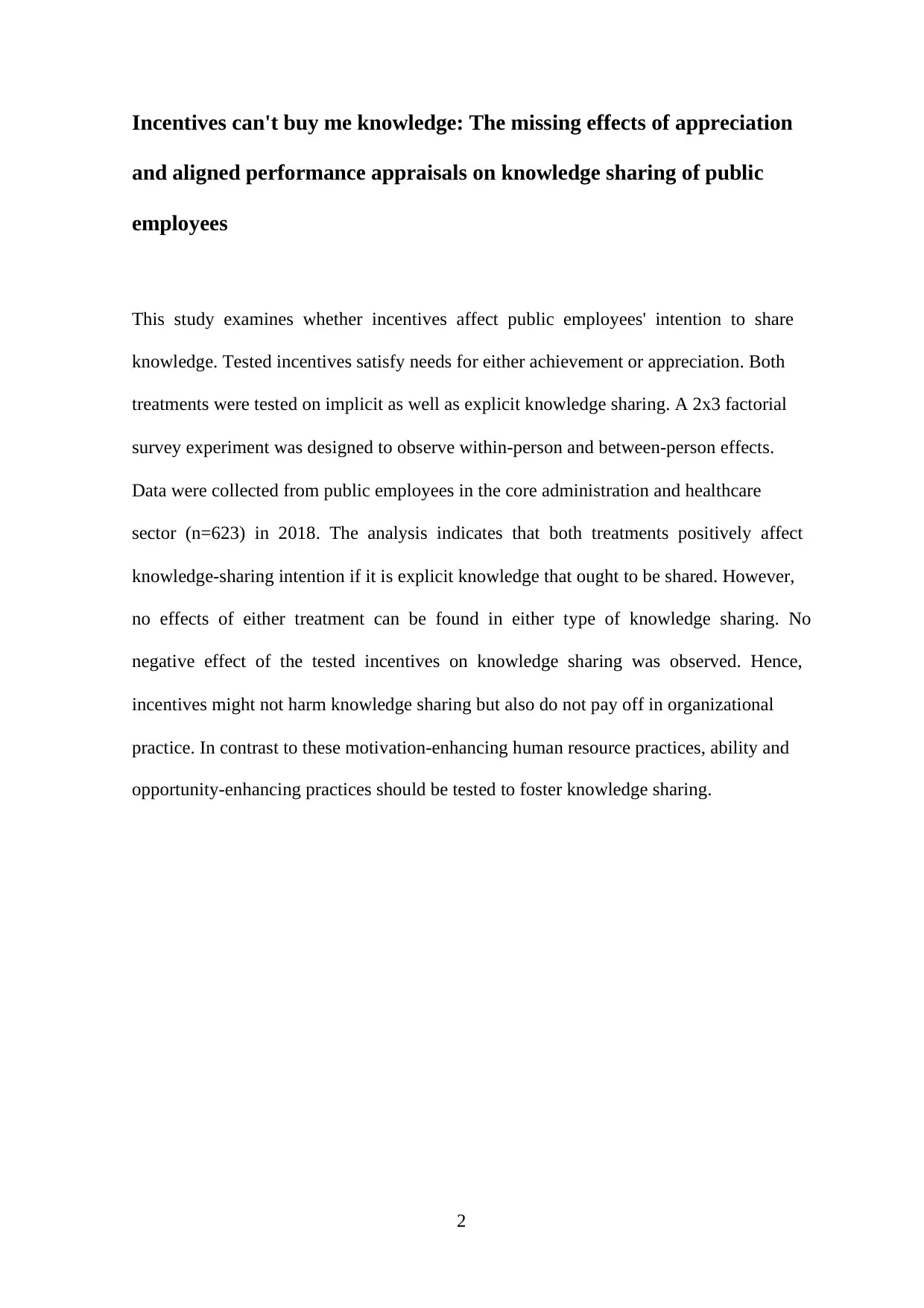
2
Incentives can't buy me knowledge: The missing effects of appreciation
and aligned performance appraisals on knowledge sharing of public
employees
This study examines whether incentives affect public employees' intention to share
knowledge. Tested incentives satisfy needs for either achievement or appreciation. Both
treatments were tested on implicit as well as explicit knowledge sharing. A 2x3 factorial
survey experiment was designed to observe within-person and between-person effects.
Data were collected from public employees in the core administration and healthcare
sector (n=623) in 2018. The analysis indicates that both treatments positively affect
knowledge-sharing intention if it is explicit knowledge that ought to be shared. However,
no effects of either treatment can be found in either type of knowledge sharing. No
negative effect of the tested incentives on knowledge sharing was observed. Hence,
incentives might not harm knowledge sharing but also do not pay off in organizational
practice. In contrast to these motivation-enhancing human resource practices, ability and
opportunity-enhancing practices should be tested to foster knowledge sharing.
Incentives can't buy me knowledge: The missing effects of appreciation
and aligned performance appraisals on knowledge sharing of public
employees
This study examines whether incentives affect public employees' intention to share
knowledge. Tested incentives satisfy needs for either achievement or appreciation. Both
treatments were tested on implicit as well as explicit knowledge sharing. A 2x3 factorial
survey experiment was designed to observe within-person and between-person effects.
Data were collected from public employees in the core administration and healthcare
sector (n=623) in 2018. The analysis indicates that both treatments positively affect
knowledge-sharing intention if it is explicit knowledge that ought to be shared. However,
no effects of either treatment can be found in either type of knowledge sharing. No
negative effect of the tested incentives on knowledge sharing was observed. Hence,
incentives might not harm knowledge sharing but also do not pay off in organizational
practice. In contrast to these motivation-enhancing human resource practices, ability and
opportunity-enhancing practices should be tested to foster knowledge sharing.
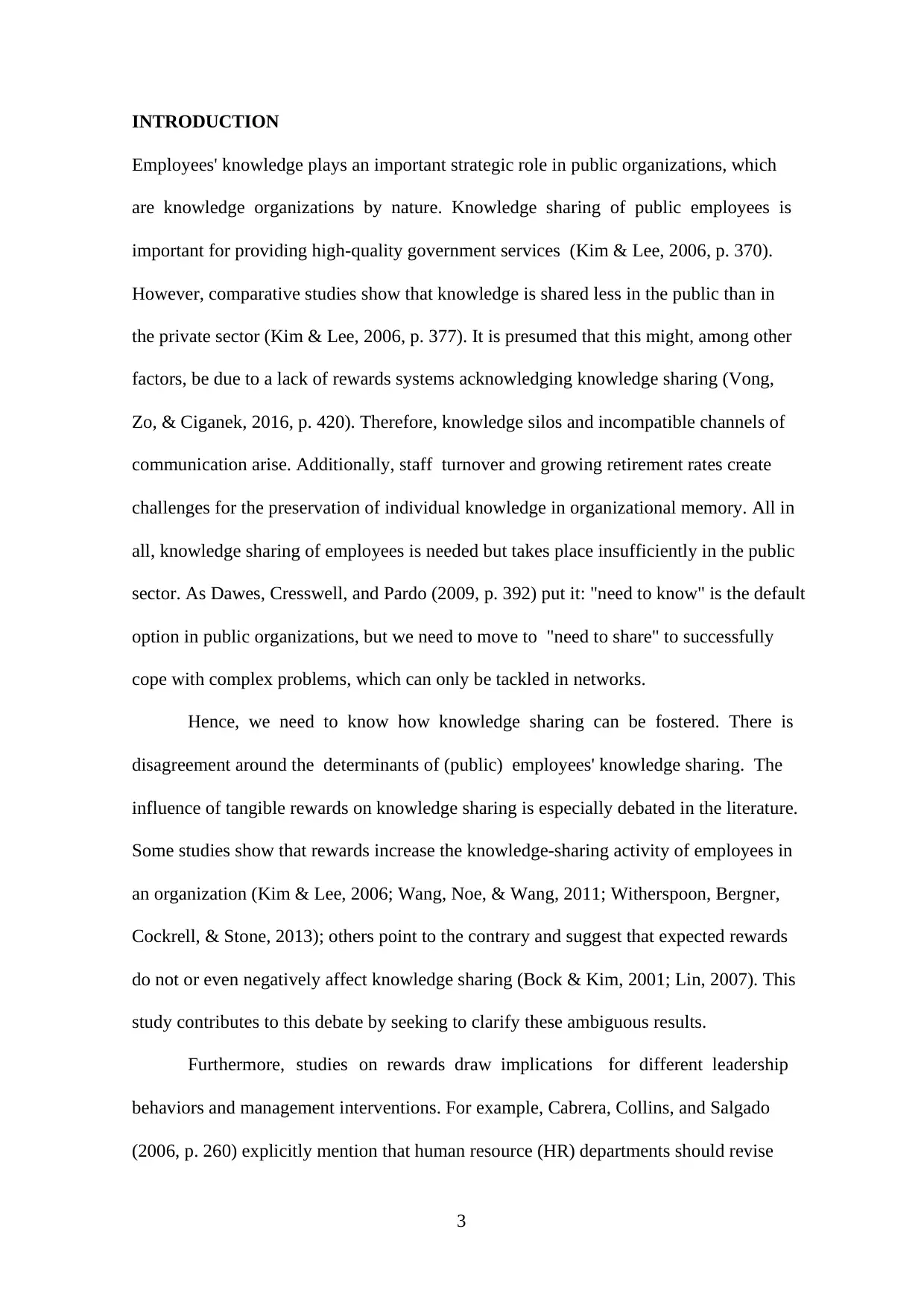
3
INTRODUCTION
Employees' knowledge plays an important strategic role in public organizations, which
are knowledge organizations by nature. Knowledge sharing of public employees is
important for providing high-quality government services (Kim & Lee, 2006, p. 370).
However, comparative studies show that knowledge is shared less in the public than in
the private sector (Kim & Lee, 2006, p. 377). It is presumed that this might, among other
factors, be due to a lack of rewards systems acknowledging knowledge sharing (Vong,
Zo, & Ciganek, 2016, p. 420). Therefore, knowledge silos and incompatible channels of
communication arise. Additionally, staff turnover and growing retirement rates create
challenges for the preservation of individual knowledge in organizational memory. All in
all, knowledge sharing of employees is needed but takes place insufficiently in the public
sector. As Dawes, Cresswell, and Pardo (2009, p. 392) put it: "need to know" is the default
option in public organizations, but we need to move to "need to share" to successfully
cope with complex problems, which can only be tackled in networks.
Hence, we need to know how knowledge sharing can be fostered. There is
disagreement around the determinants of (public) employees' knowledge sharing. The
influence of tangible rewards on knowledge sharing is especially debated in the literature.
Some studies show that rewards increase the knowledge-sharing activity of employees in
an organization (Kim & Lee, 2006; Wang, Noe, & Wang, 2011; Witherspoon, Bergner,
Cockrell, & Stone, 2013); others point to the contrary and suggest that expected rewards
do not or even negatively affect knowledge sharing (Bock & Kim, 2001; Lin, 2007). This
study contributes to this debate by seeking to clarify these ambiguous results.
Furthermore, studies on rewards draw implications for different leadership
behaviors and management interventions. For example, Cabrera, Collins, and Salgado
(2006, p. 260) explicitly mention that human resource (HR) departments should revise
INTRODUCTION
Employees' knowledge plays an important strategic role in public organizations, which
are knowledge organizations by nature. Knowledge sharing of public employees is
important for providing high-quality government services (Kim & Lee, 2006, p. 370).
However, comparative studies show that knowledge is shared less in the public than in
the private sector (Kim & Lee, 2006, p. 377). It is presumed that this might, among other
factors, be due to a lack of rewards systems acknowledging knowledge sharing (Vong,
Zo, & Ciganek, 2016, p. 420). Therefore, knowledge silos and incompatible channels of
communication arise. Additionally, staff turnover and growing retirement rates create
challenges for the preservation of individual knowledge in organizational memory. All in
all, knowledge sharing of employees is needed but takes place insufficiently in the public
sector. As Dawes, Cresswell, and Pardo (2009, p. 392) put it: "need to know" is the default
option in public organizations, but we need to move to "need to share" to successfully
cope with complex problems, which can only be tackled in networks.
Hence, we need to know how knowledge sharing can be fostered. There is
disagreement around the determinants of (public) employees' knowledge sharing. The
influence of tangible rewards on knowledge sharing is especially debated in the literature.
Some studies show that rewards increase the knowledge-sharing activity of employees in
an organization (Kim & Lee, 2006; Wang, Noe, & Wang, 2011; Witherspoon, Bergner,
Cockrell, & Stone, 2013); others point to the contrary and suggest that expected rewards
do not or even negatively affect knowledge sharing (Bock & Kim, 2001; Lin, 2007). This
study contributes to this debate by seeking to clarify these ambiguous results.
Furthermore, studies on rewards draw implications for different leadership
behaviors and management interventions. For example, Cabrera, Collins, and Salgado
(2006, p. 260) explicitly mention that human resource (HR) departments should revise
⊘ This is a preview!⊘
Do you want full access?
Subscribe today to unlock all pages.

Trusted by 1+ million students worldwide
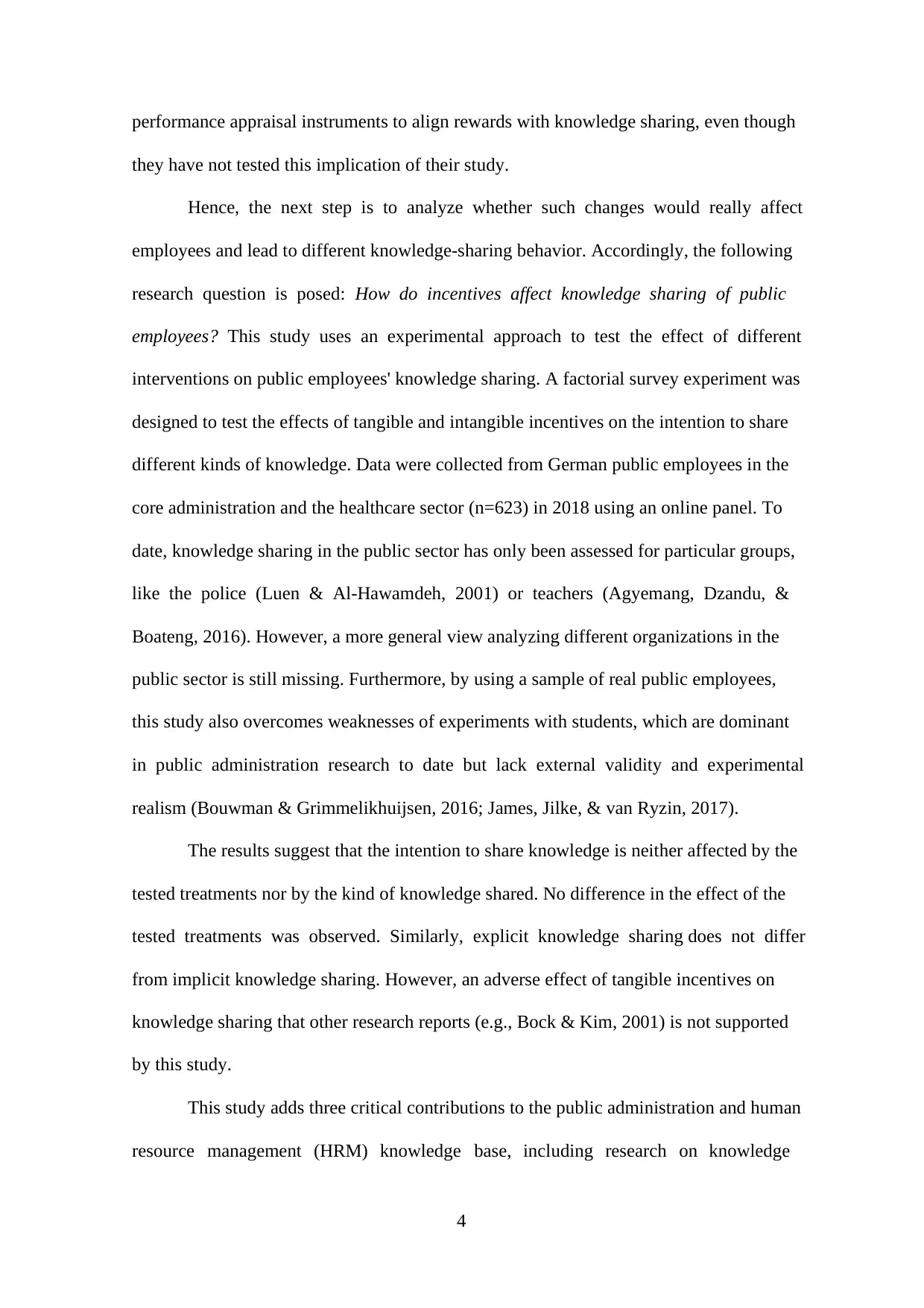
4
performance appraisal instruments to align rewards with knowledge sharing, even though
they have not tested this implication of their study.
Hence, the next step is to analyze whether such changes would really affect
employees and lead to different knowledge-sharing behavior. Accordingly, the following
research question is posed: How do incentives affect knowledge sharing of public
employees? This study uses an experimental approach to test the effect of different
interventions on public employees' knowledge sharing. A factorial survey experiment was
designed to test the effects of tangible and intangible incentives on the intention to share
different kinds of knowledge. Data were collected from German public employees in the
core administration and the healthcare sector (n=623) in 2018 using an online panel. To
date, knowledge sharing in the public sector has only been assessed for particular groups,
like the police (Luen & Al-Hawamdeh, 2001) or teachers (Agyemang, Dzandu, &
Boateng, 2016). However, a more general view analyzing different organizations in the
public sector is still missing. Furthermore, by using a sample of real public employees,
this study also overcomes weaknesses of experiments with students, which are dominant
in public administration research to date but lack external validity and experimental
realism (Bouwman & Grimmelikhuijsen, 2016; James, Jilke, & van Ryzin, 2017).
The results suggest that the intention to share knowledge is neither affected by the
tested treatments nor by the kind of knowledge shared. No difference in the effect of the
tested treatments was observed. Similarly, explicit knowledge sharing does not differ
from implicit knowledge sharing. However, an adverse effect of tangible incentives on
knowledge sharing that other research reports (e.g., Bock & Kim, 2001) is not supported
by this study.
This study adds three critical contributions to the public administration and human
resource management (HRM) knowledge base, including research on knowledge
performance appraisal instruments to align rewards with knowledge sharing, even though
they have not tested this implication of their study.
Hence, the next step is to analyze whether such changes would really affect
employees and lead to different knowledge-sharing behavior. Accordingly, the following
research question is posed: How do incentives affect knowledge sharing of public
employees? This study uses an experimental approach to test the effect of different
interventions on public employees' knowledge sharing. A factorial survey experiment was
designed to test the effects of tangible and intangible incentives on the intention to share
different kinds of knowledge. Data were collected from German public employees in the
core administration and the healthcare sector (n=623) in 2018 using an online panel. To
date, knowledge sharing in the public sector has only been assessed for particular groups,
like the police (Luen & Al-Hawamdeh, 2001) or teachers (Agyemang, Dzandu, &
Boateng, 2016). However, a more general view analyzing different organizations in the
public sector is still missing. Furthermore, by using a sample of real public employees,
this study also overcomes weaknesses of experiments with students, which are dominant
in public administration research to date but lack external validity and experimental
realism (Bouwman & Grimmelikhuijsen, 2016; James, Jilke, & van Ryzin, 2017).
The results suggest that the intention to share knowledge is neither affected by the
tested treatments nor by the kind of knowledge shared. No difference in the effect of the
tested treatments was observed. Similarly, explicit knowledge sharing does not differ
from implicit knowledge sharing. However, an adverse effect of tangible incentives on
knowledge sharing that other research reports (e.g., Bock & Kim, 2001) is not supported
by this study.
This study adds three critical contributions to the public administration and human
resource management (HRM) knowledge base, including research on knowledge
Paraphrase This Document
Need a fresh take? Get an instant paraphrase of this document with our AI Paraphraser
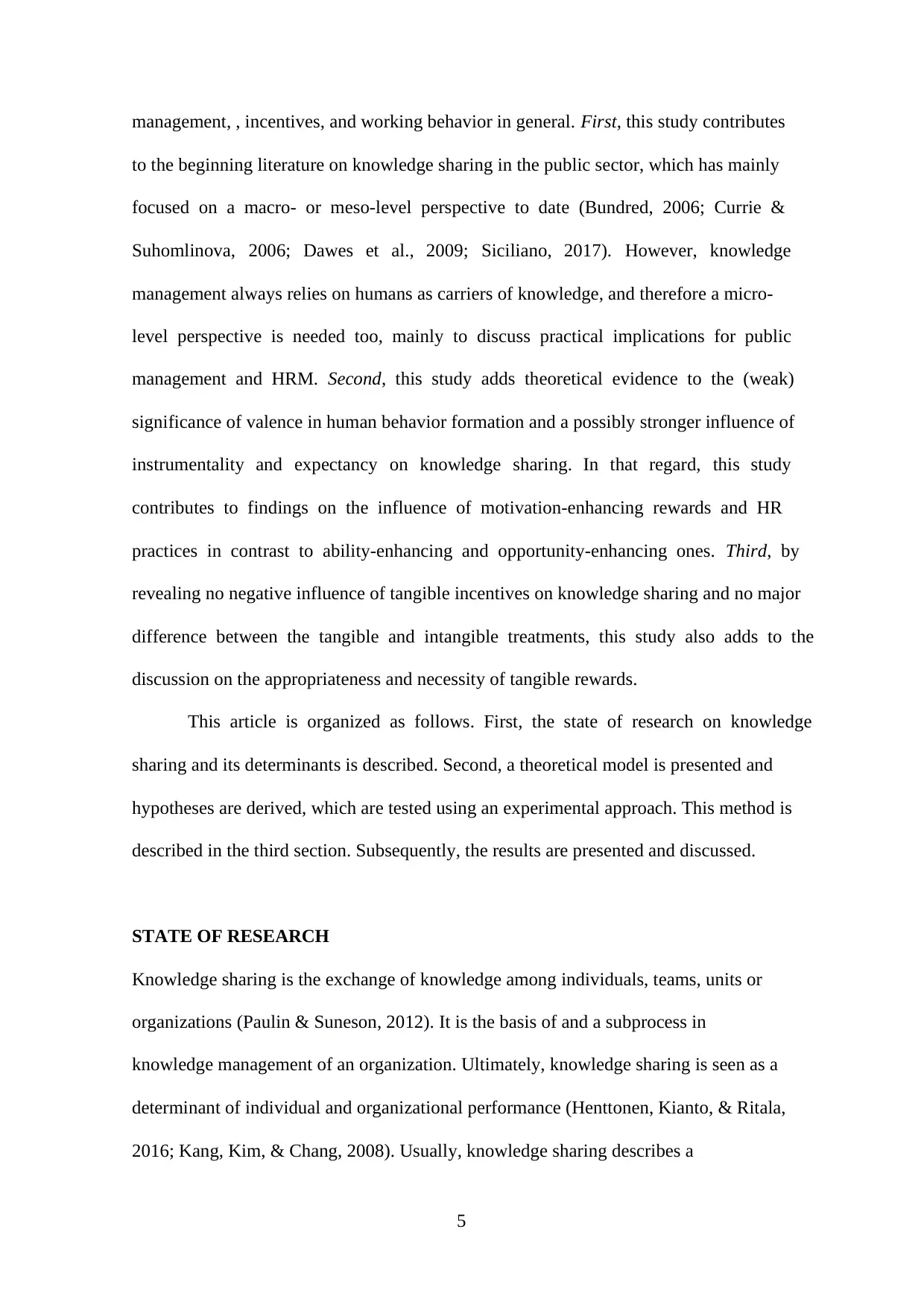
5
management, , incentives, and working behavior in general. First, this study contributes
to the beginning literature on knowledge sharing in the public sector, which has mainly
focused on a macro- or meso-level perspective to date (Bundred, 2006; Currie &
Suhomlinova, 2006; Dawes et al., 2009; Siciliano, 2017). However, knowledge
management always relies on humans as carriers of knowledge, and therefore a micro-
level perspective is needed too, mainly to discuss practical implications for public
management and HRM. Second, this study adds theoretical evidence to the (weak)
significance of valence in human behavior formation and a possibly stronger influence of
instrumentality and expectancy on knowledge sharing. In that regard, this study
contributes to findings on the influence of motivation-enhancing rewards and HR
practices in contrast to ability-enhancing and opportunity-enhancing ones. Third, by
revealing no negative influence of tangible incentives on knowledge sharing and no major
difference between the tangible and intangible treatments, this study also adds to the
discussion on the appropriateness and necessity of tangible rewards.
This article is organized as follows. First, the state of research on knowledge
sharing and its determinants is described. Second, a theoretical model is presented and
hypotheses are derived, which are tested using an experimental approach. This method is
described in the third section. Subsequently, the results are presented and discussed.
STATE OF RESEARCH
Knowledge sharing is the exchange of knowledge among individuals, teams, units or
organizations (Paulin & Suneson, 2012). It is the basis of and a subprocess in
knowledge management of an organization. Ultimately, knowledge sharing is seen as a
determinant of individual and organizational performance (Henttonen, Kianto, & Ritala,
2016; Kang, Kim, & Chang, 2008). Usually, knowledge sharing describes a
management, , incentives, and working behavior in general. First, this study contributes
to the beginning literature on knowledge sharing in the public sector, which has mainly
focused on a macro- or meso-level perspective to date (Bundred, 2006; Currie &
Suhomlinova, 2006; Dawes et al., 2009; Siciliano, 2017). However, knowledge
management always relies on humans as carriers of knowledge, and therefore a micro-
level perspective is needed too, mainly to discuss practical implications for public
management and HRM. Second, this study adds theoretical evidence to the (weak)
significance of valence in human behavior formation and a possibly stronger influence of
instrumentality and expectancy on knowledge sharing. In that regard, this study
contributes to findings on the influence of motivation-enhancing rewards and HR
practices in contrast to ability-enhancing and opportunity-enhancing ones. Third, by
revealing no negative influence of tangible incentives on knowledge sharing and no major
difference between the tangible and intangible treatments, this study also adds to the
discussion on the appropriateness and necessity of tangible rewards.
This article is organized as follows. First, the state of research on knowledge
sharing and its determinants is described. Second, a theoretical model is presented and
hypotheses are derived, which are tested using an experimental approach. This method is
described in the third section. Subsequently, the results are presented and discussed.
STATE OF RESEARCH
Knowledge sharing is the exchange of knowledge among individuals, teams, units or
organizations (Paulin & Suneson, 2012). It is the basis of and a subprocess in
knowledge management of an organization. Ultimately, knowledge sharing is seen as a
determinant of individual and organizational performance (Henttonen, Kianto, & Ritala,
2016; Kang, Kim, & Chang, 2008). Usually, knowledge sharing describes a
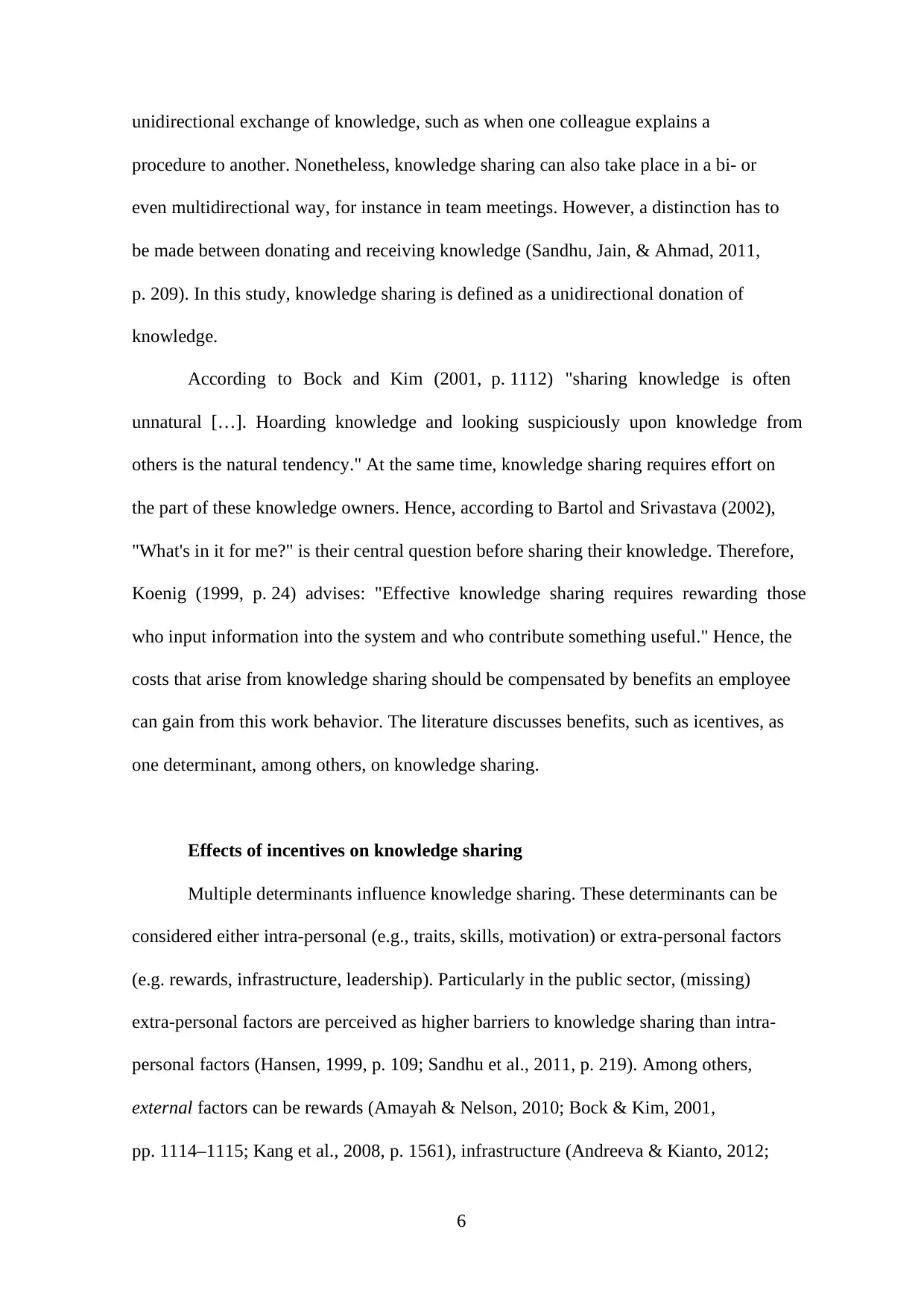
6
unidirectional exchange of knowledge, such as when one colleague explains a
procedure to another. Nonetheless, knowledge sharing can also take place in a bi- or
even multidirectional way, for instance in team meetings. However, a distinction has to
be made between donating and receiving knowledge (Sandhu, Jain, & Ahmad, 2011,
p. 209). In this study, knowledge sharing is defined as a unidirectional donation of
knowledge.
According to Bock and Kim (2001, p. 1112) "sharing knowledge is often
unnatural […]. Hoarding knowledge and looking suspiciously upon knowledge from
others is the natural tendency." At the same time, knowledge sharing requires effort on
the part of these knowledge owners. Hence, according to Bartol and Srivastava (2002),
"What's in it for me?" is their central question before sharing their knowledge. Therefore,
Koenig (1999, p. 24) advises: "Effective knowledge sharing requires rewarding those
who input information into the system and who contribute something useful." Hence, the
costs that arise from knowledge sharing should be compensated by benefits an employee
can gain from this work behavior. The literature discusses benefits, such as icentives, as
one determinant, among others, on knowledge sharing.
Effects of incentives on knowledge sharing
Multiple determinants influence knowledge sharing. These determinants can be
considered either intra-personal (e.g., traits, skills, motivation) or extra-personal factors
(e.g. rewards, infrastructure, leadership). Particularly in the public sector, (missing)
extra-personal factors are perceived as higher barriers to knowledge sharing than intra-
personal factors (Hansen, 1999, p. 109; Sandhu et al., 2011, p. 219). Among others,
external factors can be rewards (Amayah & Nelson, 2010; Bock & Kim, 2001,
pp. 1114–1115; Kang et al., 2008, p. 1561), infrastructure (Andreeva & Kianto, 2012;
unidirectional exchange of knowledge, such as when one colleague explains a
procedure to another. Nonetheless, knowledge sharing can also take place in a bi- or
even multidirectional way, for instance in team meetings. However, a distinction has to
be made between donating and receiving knowledge (Sandhu, Jain, & Ahmad, 2011,
p. 209). In this study, knowledge sharing is defined as a unidirectional donation of
knowledge.
According to Bock and Kim (2001, p. 1112) "sharing knowledge is often
unnatural […]. Hoarding knowledge and looking suspiciously upon knowledge from
others is the natural tendency." At the same time, knowledge sharing requires effort on
the part of these knowledge owners. Hence, according to Bartol and Srivastava (2002),
"What's in it for me?" is their central question before sharing their knowledge. Therefore,
Koenig (1999, p. 24) advises: "Effective knowledge sharing requires rewarding those
who input information into the system and who contribute something useful." Hence, the
costs that arise from knowledge sharing should be compensated by benefits an employee
can gain from this work behavior. The literature discusses benefits, such as icentives, as
one determinant, among others, on knowledge sharing.
Effects of incentives on knowledge sharing
Multiple determinants influence knowledge sharing. These determinants can be
considered either intra-personal (e.g., traits, skills, motivation) or extra-personal factors
(e.g. rewards, infrastructure, leadership). Particularly in the public sector, (missing)
extra-personal factors are perceived as higher barriers to knowledge sharing than intra-
personal factors (Hansen, 1999, p. 109; Sandhu et al., 2011, p. 219). Among others,
external factors can be rewards (Amayah & Nelson, 2010; Bock & Kim, 2001,
pp. 1114–1115; Kang et al., 2008, p. 1561), infrastructure (Andreeva & Kianto, 2012;
⊘ This is a preview!⊘
Do you want full access?
Subscribe today to unlock all pages.

Trusted by 1+ million students worldwide
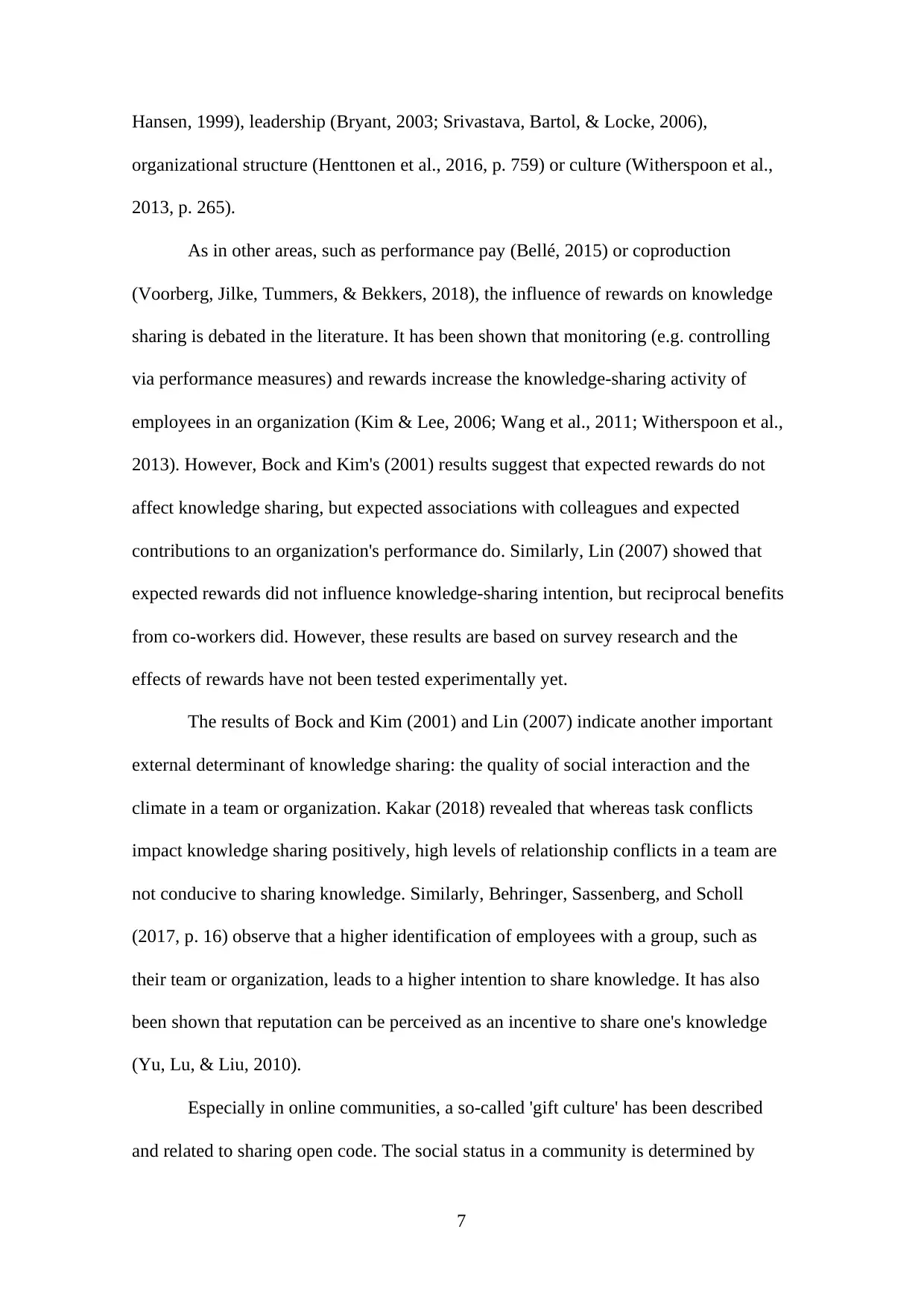
7
Hansen, 1999), leadership (Bryant, 2003; Srivastava, Bartol, & Locke, 2006),
organizational structure (Henttonen et al., 2016, p. 759) or culture (Witherspoon et al.,
2013, p. 265).
As in other areas, such as performance pay (Bellé, 2015) or coproduction
(Voorberg, Jilke, Tummers, & Bekkers, 2018), the influence of rewards on knowledge
sharing is debated in the literature. It has been shown that monitoring (e.g. controlling
via performance measures) and rewards increase the knowledge-sharing activity of
employees in an organization (Kim & Lee, 2006; Wang et al., 2011; Witherspoon et al.,
2013). However, Bock and Kim's (2001) results suggest that expected rewards do not
affect knowledge sharing, but expected associations with colleagues and expected
contributions to an organization's performance do. Similarly, Lin (2007) showed that
expected rewards did not influence knowledge-sharing intention, but reciprocal benefits
from co-workers did. However, these results are based on survey research and the
effects of rewards have not been tested experimentally yet.
The results of Bock and Kim (2001) and Lin (2007) indicate another important
external determinant of knowledge sharing: the quality of social interaction and the
climate in a team or organization. Kakar (2018) revealed that whereas task conflicts
impact knowledge sharing positively, high levels of relationship conflicts in a team are
not conducive to sharing knowledge. Similarly, Behringer, Sassenberg, and Scholl
(2017, p. 16) observe that a higher identification of employees with a group, such as
their team or organization, leads to a higher intention to share knowledge. It has also
been shown that reputation can be perceived as an incentive to share one's knowledge
(Yu, Lu, & Liu, 2010).
Especially in online communities, a so-called 'gift culture' has been described
and related to sharing open code. The social status in a community is determined by
Hansen, 1999), leadership (Bryant, 2003; Srivastava, Bartol, & Locke, 2006),
organizational structure (Henttonen et al., 2016, p. 759) or culture (Witherspoon et al.,
2013, p. 265).
As in other areas, such as performance pay (Bellé, 2015) or coproduction
(Voorberg, Jilke, Tummers, & Bekkers, 2018), the influence of rewards on knowledge
sharing is debated in the literature. It has been shown that monitoring (e.g. controlling
via performance measures) and rewards increase the knowledge-sharing activity of
employees in an organization (Kim & Lee, 2006; Wang et al., 2011; Witherspoon et al.,
2013). However, Bock and Kim's (2001) results suggest that expected rewards do not
affect knowledge sharing, but expected associations with colleagues and expected
contributions to an organization's performance do. Similarly, Lin (2007) showed that
expected rewards did not influence knowledge-sharing intention, but reciprocal benefits
from co-workers did. However, these results are based on survey research and the
effects of rewards have not been tested experimentally yet.
The results of Bock and Kim (2001) and Lin (2007) indicate another important
external determinant of knowledge sharing: the quality of social interaction and the
climate in a team or organization. Kakar (2018) revealed that whereas task conflicts
impact knowledge sharing positively, high levels of relationship conflicts in a team are
not conducive to sharing knowledge. Similarly, Behringer, Sassenberg, and Scholl
(2017, p. 16) observe that a higher identification of employees with a group, such as
their team or organization, leads to a higher intention to share knowledge. It has also
been shown that reputation can be perceived as an incentive to share one's knowledge
(Yu, Lu, & Liu, 2010).
Especially in online communities, a so-called 'gift culture' has been described
and related to sharing open code. The social status in a community is determined by
Paraphrase This Document
Need a fresh take? Get an instant paraphrase of this document with our AI Paraphraser
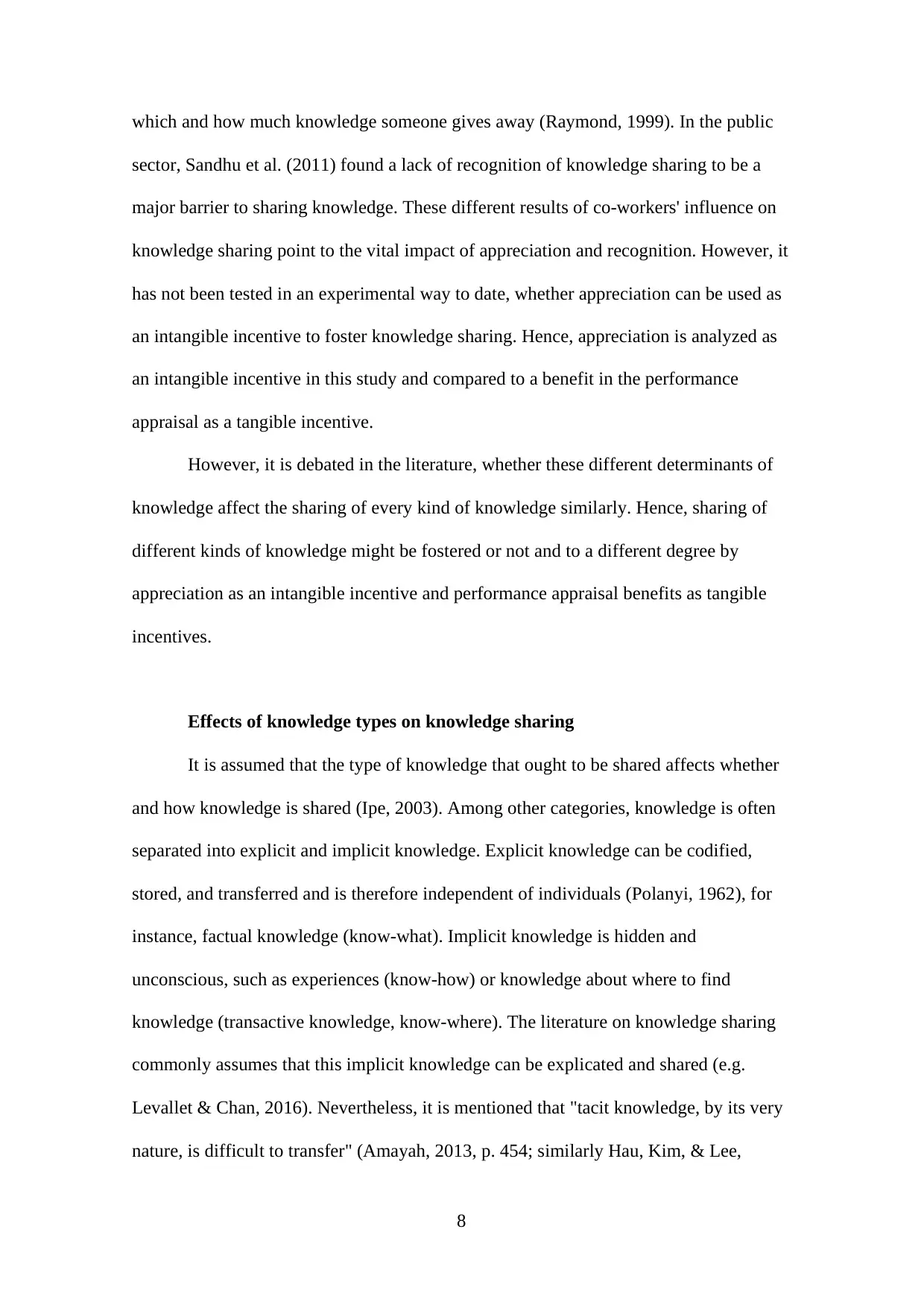
8
which and how much knowledge someone gives away (Raymond, 1999). In the public
sector, Sandhu et al. (2011) found a lack of recognition of knowledge sharing to be a
major barrier to sharing knowledge. These different results of co-workers' influence on
knowledge sharing point to the vital impact of appreciation and recognition. However, it
has not been tested in an experimental way to date, whether appreciation can be used as
an intangible incentive to foster knowledge sharing. Hence, appreciation is analyzed as
an intangible incentive in this study and compared to a benefit in the performance
appraisal as a tangible incentive.
However, it is debated in the literature, whether these different determinants of
knowledge affect the sharing of every kind of knowledge similarly. Hence, sharing of
different kinds of knowledge might be fostered or not and to a different degree by
appreciation as an intangible incentive and performance appraisal benefits as tangible
incentives.
Effects of knowledge types on knowledge sharing
It is assumed that the type of knowledge that ought to be shared affects whether
and how knowledge is shared (Ipe, 2003). Among other categories, knowledge is often
separated into explicit and implicit knowledge. Explicit knowledge can be codified,
stored, and transferred and is therefore independent of individuals (Polanyi, 1962), for
instance, factual knowledge (know-what). Implicit knowledge is hidden and
unconscious, such as experiences (know-how) or knowledge about where to find
knowledge (transactive knowledge, know-where). The literature on knowledge sharing
commonly assumes that this implicit knowledge can be explicated and shared (e.g.
Levallet & Chan, 2016). Nevertheless, it is mentioned that "tacit knowledge, by its very
nature, is difficult to transfer" (Amayah, 2013, p. 454; similarly Hau, Kim, & Lee,
which and how much knowledge someone gives away (Raymond, 1999). In the public
sector, Sandhu et al. (2011) found a lack of recognition of knowledge sharing to be a
major barrier to sharing knowledge. These different results of co-workers' influence on
knowledge sharing point to the vital impact of appreciation and recognition. However, it
has not been tested in an experimental way to date, whether appreciation can be used as
an intangible incentive to foster knowledge sharing. Hence, appreciation is analyzed as
an intangible incentive in this study and compared to a benefit in the performance
appraisal as a tangible incentive.
However, it is debated in the literature, whether these different determinants of
knowledge affect the sharing of every kind of knowledge similarly. Hence, sharing of
different kinds of knowledge might be fostered or not and to a different degree by
appreciation as an intangible incentive and performance appraisal benefits as tangible
incentives.
Effects of knowledge types on knowledge sharing
It is assumed that the type of knowledge that ought to be shared affects whether
and how knowledge is shared (Ipe, 2003). Among other categories, knowledge is often
separated into explicit and implicit knowledge. Explicit knowledge can be codified,
stored, and transferred and is therefore independent of individuals (Polanyi, 1962), for
instance, factual knowledge (know-what). Implicit knowledge is hidden and
unconscious, such as experiences (know-how) or knowledge about where to find
knowledge (transactive knowledge, know-where). The literature on knowledge sharing
commonly assumes that this implicit knowledge can be explicated and shared (e.g.
Levallet & Chan, 2016). Nevertheless, it is mentioned that "tacit knowledge, by its very
nature, is difficult to transfer" (Amayah, 2013, p. 454; similarly Hau, Kim, & Lee,
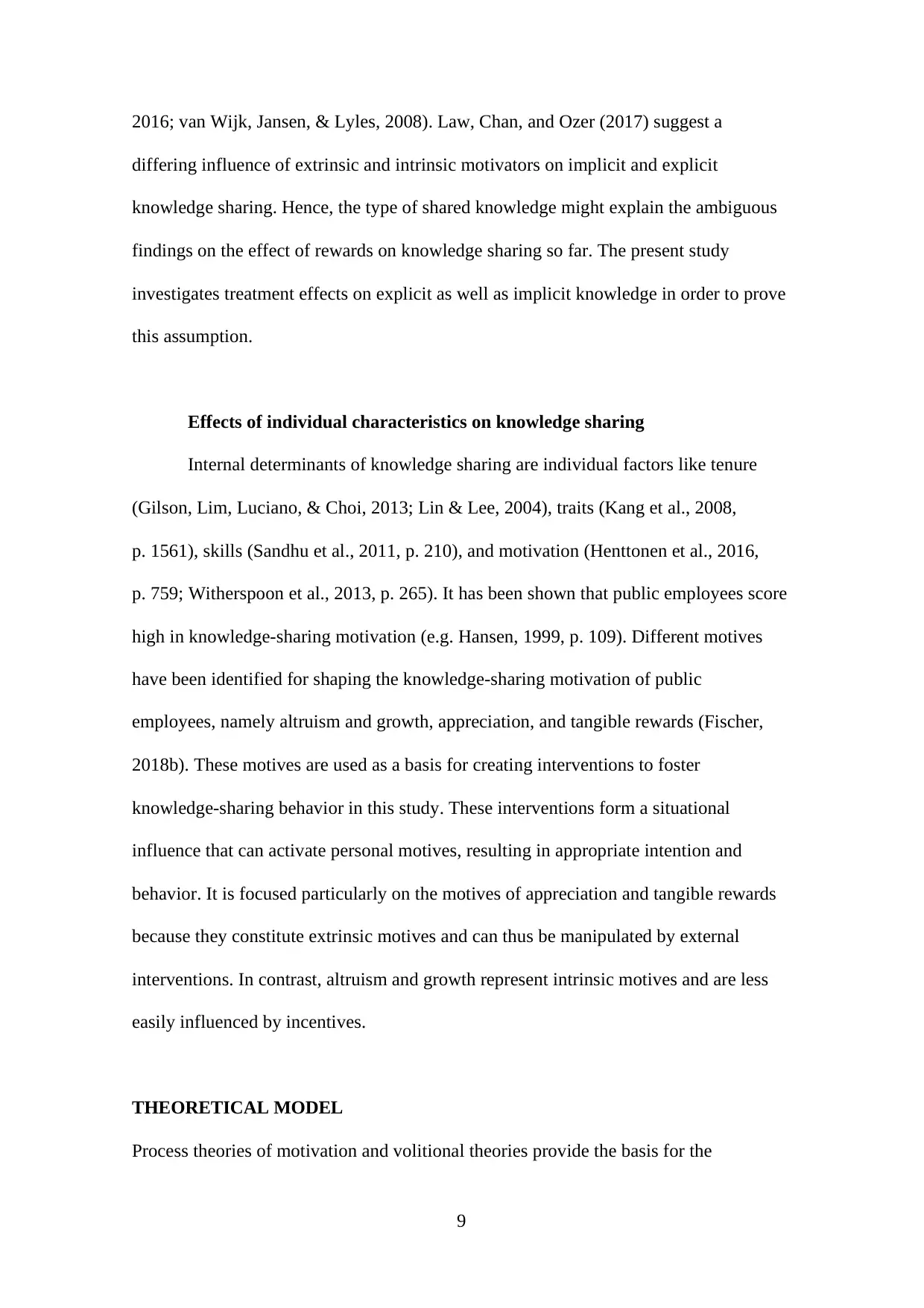
9
2016; van Wijk, Jansen, & Lyles, 2008). Law, Chan, and Ozer (2017) suggest a
differing influence of extrinsic and intrinsic motivators on implicit and explicit
knowledge sharing. Hence, the type of shared knowledge might explain the ambiguous
findings on the effect of rewards on knowledge sharing so far. The present study
investigates treatment effects on explicit as well as implicit knowledge in order to prove
this assumption.
Effects of individual characteristics on knowledge sharing
Internal determinants of knowledge sharing are individual factors like tenure
(Gilson, Lim, Luciano, & Choi, 2013; Lin & Lee, 2004), traits (Kang et al., 2008,
p. 1561), skills (Sandhu et al., 2011, p. 210), and motivation (Henttonen et al., 2016,
p. 759; Witherspoon et al., 2013, p. 265). It has been shown that public employees score
high in knowledge-sharing motivation (e.g. Hansen, 1999, p. 109). Different motives
have been identified for shaping the knowledge-sharing motivation of public
employees, namely altruism and growth, appreciation, and tangible rewards (Fischer,
2018b). These motives are used as a basis for creating interventions to foster
knowledge-sharing behavior in this study. These interventions form a situational
influence that can activate personal motives, resulting in appropriate intention and
behavior. It is focused particularly on the motives of appreciation and tangible rewards
because they constitute extrinsic motives and can thus be manipulated by external
interventions. In contrast, altruism and growth represent intrinsic motives and are less
easily influenced by incentives.
THEORETICAL MODEL
Process theories of motivation and volitional theories provide the basis for the
2016; van Wijk, Jansen, & Lyles, 2008). Law, Chan, and Ozer (2017) suggest a
differing influence of extrinsic and intrinsic motivators on implicit and explicit
knowledge sharing. Hence, the type of shared knowledge might explain the ambiguous
findings on the effect of rewards on knowledge sharing so far. The present study
investigates treatment effects on explicit as well as implicit knowledge in order to prove
this assumption.
Effects of individual characteristics on knowledge sharing
Internal determinants of knowledge sharing are individual factors like tenure
(Gilson, Lim, Luciano, & Choi, 2013; Lin & Lee, 2004), traits (Kang et al., 2008,
p. 1561), skills (Sandhu et al., 2011, p. 210), and motivation (Henttonen et al., 2016,
p. 759; Witherspoon et al., 2013, p. 265). It has been shown that public employees score
high in knowledge-sharing motivation (e.g. Hansen, 1999, p. 109). Different motives
have been identified for shaping the knowledge-sharing motivation of public
employees, namely altruism and growth, appreciation, and tangible rewards (Fischer,
2018b). These motives are used as a basis for creating interventions to foster
knowledge-sharing behavior in this study. These interventions form a situational
influence that can activate personal motives, resulting in appropriate intention and
behavior. It is focused particularly on the motives of appreciation and tangible rewards
because they constitute extrinsic motives and can thus be manipulated by external
interventions. In contrast, altruism and growth represent intrinsic motives and are less
easily influenced by incentives.
THEORETICAL MODEL
Process theories of motivation and volitional theories provide the basis for the
⊘ This is a preview!⊘
Do you want full access?
Subscribe today to unlock all pages.

Trusted by 1+ million students worldwide
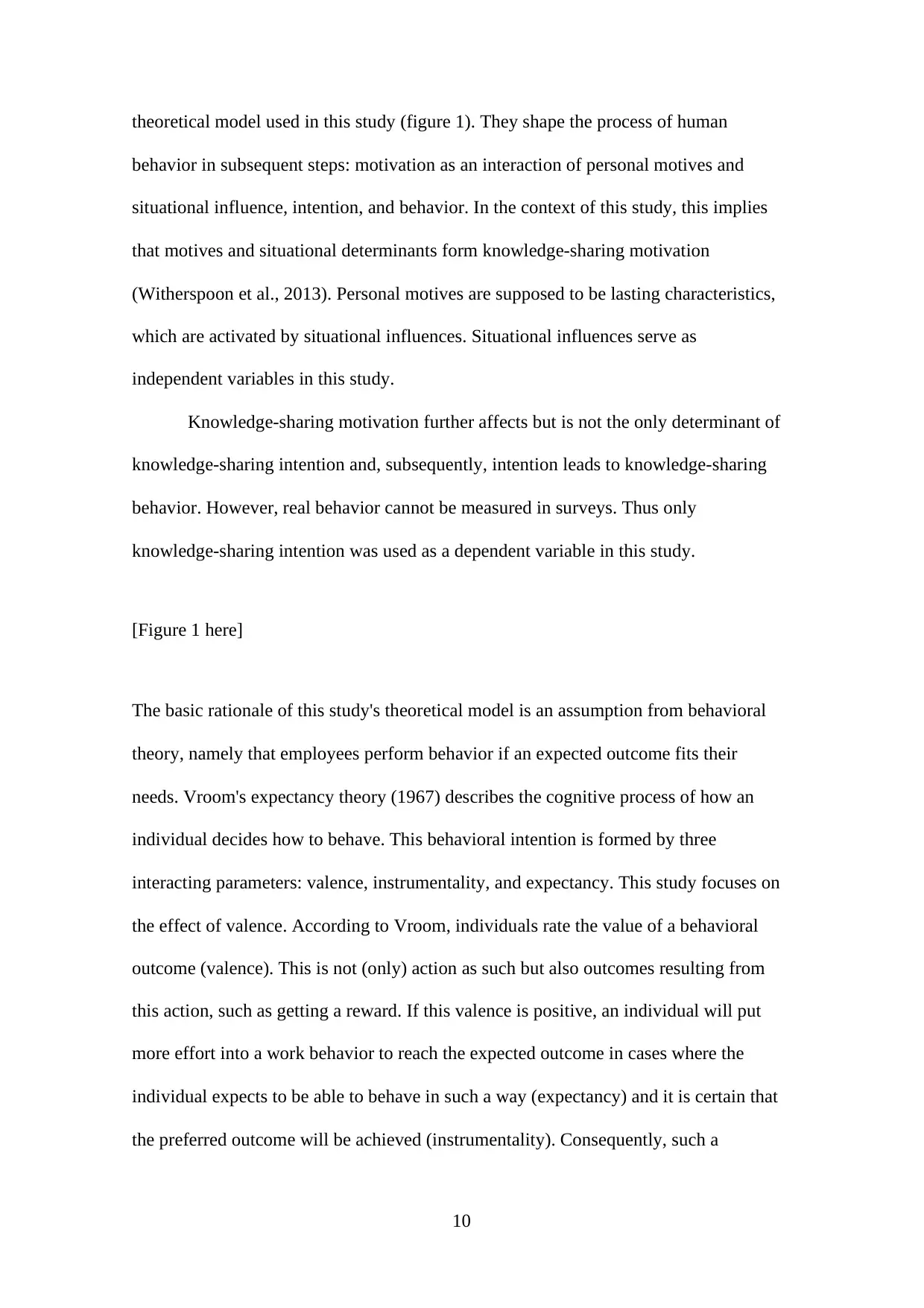
10
theoretical model used in this study (figure 1). They shape the process of human
behavior in subsequent steps: motivation as an interaction of personal motives and
situational influence, intention, and behavior. In the context of this study, this implies
that motives and situational determinants form knowledge-sharing motivation
(Witherspoon et al., 2013). Personal motives are supposed to be lasting characteristics,
which are activated by situational influences. Situational influences serve as
independent variables in this study.
Knowledge-sharing motivation further affects but is not the only determinant of
knowledge-sharing intention and, subsequently, intention leads to knowledge-sharing
behavior. However, real behavior cannot be measured in surveys. Thus only
knowledge-sharing intention was used as a dependent variable in this study.
[Figure 1 here]
The basic rationale of this study's theoretical model is an assumption from behavioral
theory, namely that employees perform behavior if an expected outcome fits their
needs. Vroom's expectancy theory (1967) describes the cognitive process of how an
individual decides how to behave. This behavioral intention is formed by three
interacting parameters: valence, instrumentality, and expectancy. This study focuses on
the effect of valence. According to Vroom, individuals rate the value of a behavioral
outcome (valence). This is not (only) action as such but also outcomes resulting from
this action, such as getting a reward. If this valence is positive, an individual will put
more effort into a work behavior to reach the expected outcome in cases where the
individual expects to be able to behave in such a way (expectancy) and it is certain that
the preferred outcome will be achieved (instrumentality). Consequently, such a
theoretical model used in this study (figure 1). They shape the process of human
behavior in subsequent steps: motivation as an interaction of personal motives and
situational influence, intention, and behavior. In the context of this study, this implies
that motives and situational determinants form knowledge-sharing motivation
(Witherspoon et al., 2013). Personal motives are supposed to be lasting characteristics,
which are activated by situational influences. Situational influences serve as
independent variables in this study.
Knowledge-sharing motivation further affects but is not the only determinant of
knowledge-sharing intention and, subsequently, intention leads to knowledge-sharing
behavior. However, real behavior cannot be measured in surveys. Thus only
knowledge-sharing intention was used as a dependent variable in this study.
[Figure 1 here]
The basic rationale of this study's theoretical model is an assumption from behavioral
theory, namely that employees perform behavior if an expected outcome fits their
needs. Vroom's expectancy theory (1967) describes the cognitive process of how an
individual decides how to behave. This behavioral intention is formed by three
interacting parameters: valence, instrumentality, and expectancy. This study focuses on
the effect of valence. According to Vroom, individuals rate the value of a behavioral
outcome (valence). This is not (only) action as such but also outcomes resulting from
this action, such as getting a reward. If this valence is positive, an individual will put
more effort into a work behavior to reach the expected outcome in cases where the
individual expects to be able to behave in such a way (expectancy) and it is certain that
the preferred outcome will be achieved (instrumentality). Consequently, such a
Paraphrase This Document
Need a fresh take? Get an instant paraphrase of this document with our AI Paraphraser
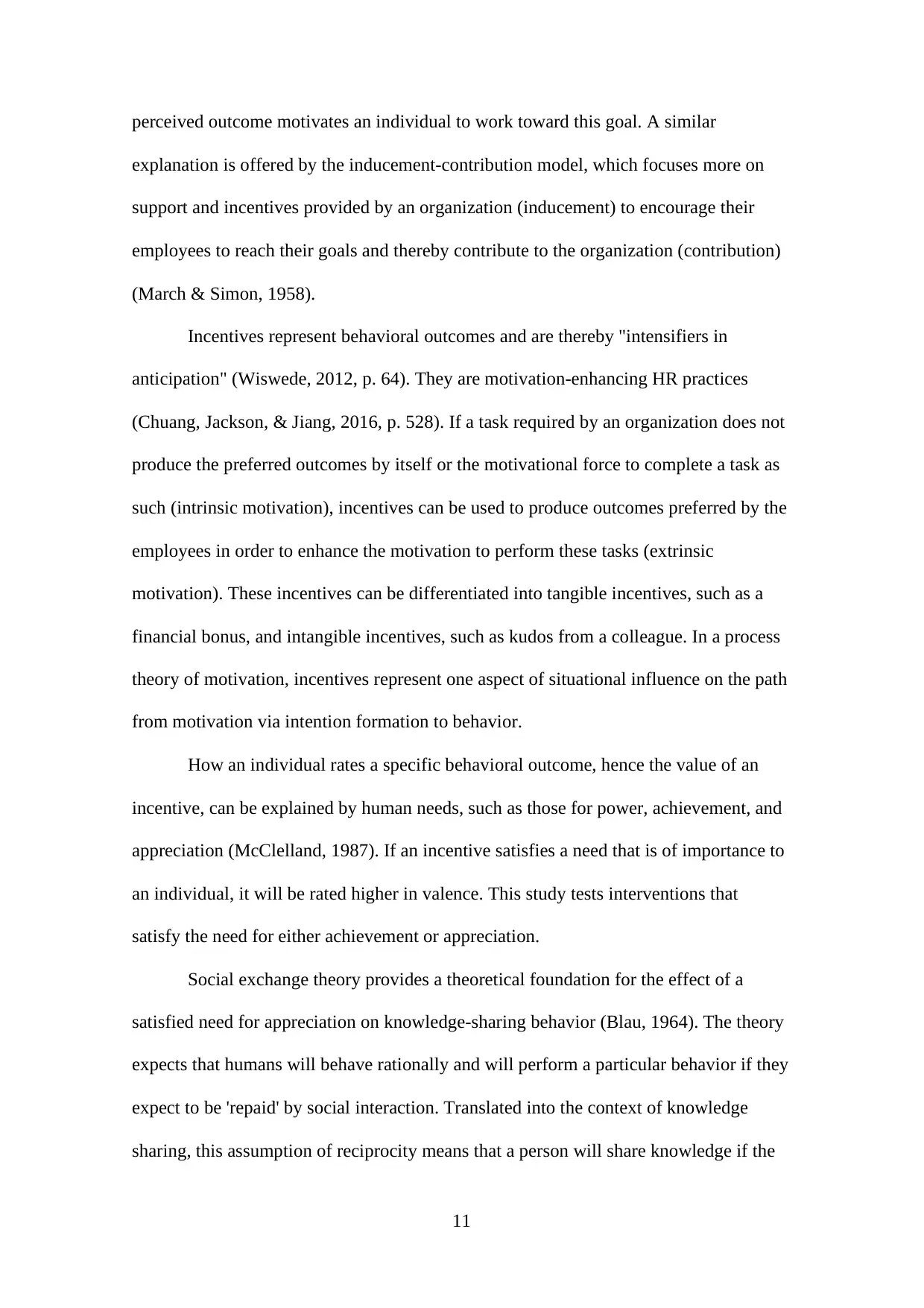
11
perceived outcome motivates an individual to work toward this goal. A similar
explanation is offered by the inducement-contribution model, which focuses more on
support and incentives provided by an organization (inducement) to encourage their
employees to reach their goals and thereby contribute to the organization (contribution)
(March & Simon, 1958).
Incentives represent behavioral outcomes and are thereby "intensifiers in
anticipation" (Wiswede, 2012, p. 64). They are motivation-enhancing HR practices
(Chuang, Jackson, & Jiang, 2016, p. 528). If a task required by an organization does not
produce the preferred outcomes by itself or the motivational force to complete a task as
such (intrinsic motivation), incentives can be used to produce outcomes preferred by the
employees in order to enhance the motivation to perform these tasks (extrinsic
motivation). These incentives can be differentiated into tangible incentives, such as a
financial bonus, and intangible incentives, such as kudos from a colleague. In a process
theory of motivation, incentives represent one aspect of situational influence on the path
from motivation via intention formation to behavior.
How an individual rates a specific behavioral outcome, hence the value of an
incentive, can be explained by human needs, such as those for power, achievement, and
appreciation (McClelland, 1987). If an incentive satisfies a need that is of importance to
an individual, it will be rated higher in valence. This study tests interventions that
satisfy the need for either achievement or appreciation.
Social exchange theory provides a theoretical foundation for the effect of a
satisfied need for appreciation on knowledge-sharing behavior (Blau, 1964). The theory
expects that humans will behave rationally and will perform a particular behavior if they
expect to be 'repaid' by social interaction. Translated into the context of knowledge
sharing, this assumption of reciprocity means that a person will share knowledge if the
perceived outcome motivates an individual to work toward this goal. A similar
explanation is offered by the inducement-contribution model, which focuses more on
support and incentives provided by an organization (inducement) to encourage their
employees to reach their goals and thereby contribute to the organization (contribution)
(March & Simon, 1958).
Incentives represent behavioral outcomes and are thereby "intensifiers in
anticipation" (Wiswede, 2012, p. 64). They are motivation-enhancing HR practices
(Chuang, Jackson, & Jiang, 2016, p. 528). If a task required by an organization does not
produce the preferred outcomes by itself or the motivational force to complete a task as
such (intrinsic motivation), incentives can be used to produce outcomes preferred by the
employees in order to enhance the motivation to perform these tasks (extrinsic
motivation). These incentives can be differentiated into tangible incentives, such as a
financial bonus, and intangible incentives, such as kudos from a colleague. In a process
theory of motivation, incentives represent one aspect of situational influence on the path
from motivation via intention formation to behavior.
How an individual rates a specific behavioral outcome, hence the value of an
incentive, can be explained by human needs, such as those for power, achievement, and
appreciation (McClelland, 1987). If an incentive satisfies a need that is of importance to
an individual, it will be rated higher in valence. This study tests interventions that
satisfy the need for either achievement or appreciation.
Social exchange theory provides a theoretical foundation for the effect of a
satisfied need for appreciation on knowledge-sharing behavior (Blau, 1964). The theory
expects that humans will behave rationally and will perform a particular behavior if they
expect to be 'repaid' by social interaction. Translated into the context of knowledge
sharing, this assumption of reciprocity means that a person will share knowledge if the
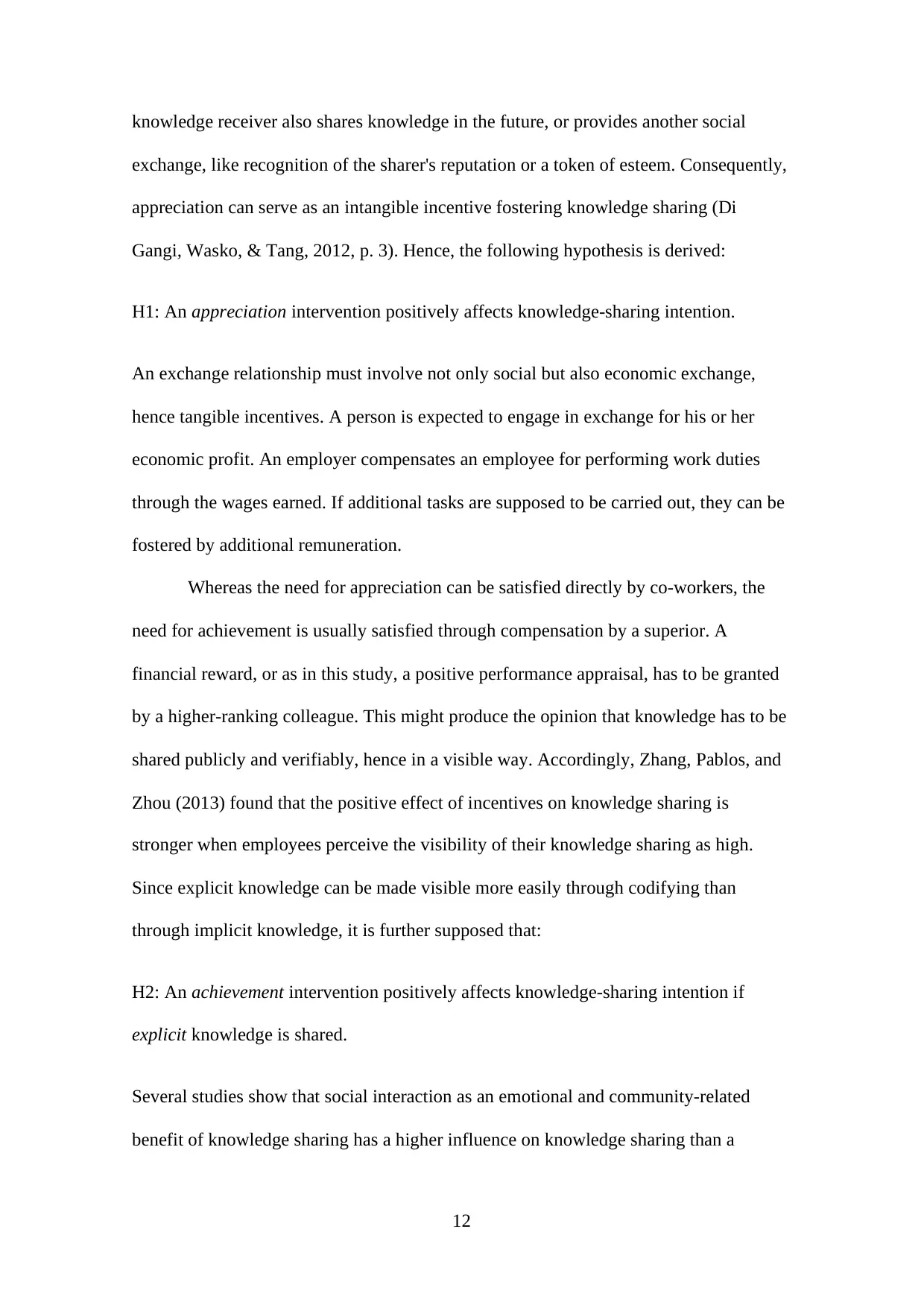
12
knowledge receiver also shares knowledge in the future, or provides another social
exchange, like recognition of the sharer's reputation or a token of esteem. Consequently,
appreciation can serve as an intangible incentive fostering knowledge sharing (Di
Gangi, Wasko, & Tang, 2012, p. 3). Hence, the following hypothesis is derived:
H1: An appreciation intervention positively affects knowledge-sharing intention.
An exchange relationship must involve not only social but also economic exchange,
hence tangible incentives. A person is expected to engage in exchange for his or her
economic profit. An employer compensates an employee for performing work duties
through the wages earned. If additional tasks are supposed to be carried out, they can be
fostered by additional remuneration.
Whereas the need for appreciation can be satisfied directly by co-workers, the
need for achievement is usually satisfied through compensation by a superior. A
financial reward, or as in this study, a positive performance appraisal, has to be granted
by a higher-ranking colleague. This might produce the opinion that knowledge has to be
shared publicly and verifiably, hence in a visible way. Accordingly, Zhang, Pablos, and
Zhou (2013) found that the positive effect of incentives on knowledge sharing is
stronger when employees perceive the visibility of their knowledge sharing as high.
Since explicit knowledge can be made visible more easily through codifying than
through implicit knowledge, it is further supposed that:
H2: An achievement intervention positively affects knowledge-sharing intention if
explicit knowledge is shared.
Several studies show that social interaction as an emotional and community-related
benefit of knowledge sharing has a higher influence on knowledge sharing than a
knowledge receiver also shares knowledge in the future, or provides another social
exchange, like recognition of the sharer's reputation or a token of esteem. Consequently,
appreciation can serve as an intangible incentive fostering knowledge sharing (Di
Gangi, Wasko, & Tang, 2012, p. 3). Hence, the following hypothesis is derived:
H1: An appreciation intervention positively affects knowledge-sharing intention.
An exchange relationship must involve not only social but also economic exchange,
hence tangible incentives. A person is expected to engage in exchange for his or her
economic profit. An employer compensates an employee for performing work duties
through the wages earned. If additional tasks are supposed to be carried out, they can be
fostered by additional remuneration.
Whereas the need for appreciation can be satisfied directly by co-workers, the
need for achievement is usually satisfied through compensation by a superior. A
financial reward, or as in this study, a positive performance appraisal, has to be granted
by a higher-ranking colleague. This might produce the opinion that knowledge has to be
shared publicly and verifiably, hence in a visible way. Accordingly, Zhang, Pablos, and
Zhou (2013) found that the positive effect of incentives on knowledge sharing is
stronger when employees perceive the visibility of their knowledge sharing as high.
Since explicit knowledge can be made visible more easily through codifying than
through implicit knowledge, it is further supposed that:
H2: An achievement intervention positively affects knowledge-sharing intention if
explicit knowledge is shared.
Several studies show that social interaction as an emotional and community-related
benefit of knowledge sharing has a higher influence on knowledge sharing than a
⊘ This is a preview!⊘
Do you want full access?
Subscribe today to unlock all pages.

Trusted by 1+ million students worldwide
1 out of 38
Your All-in-One AI-Powered Toolkit for Academic Success.
+13062052269
info@desklib.com
Available 24*7 on WhatsApp / Email
![[object Object]](/_next/static/media/star-bottom.7253800d.svg)
Unlock your academic potential
Copyright © 2020–2026 A2Z Services. All Rights Reserved. Developed and managed by ZUCOL.